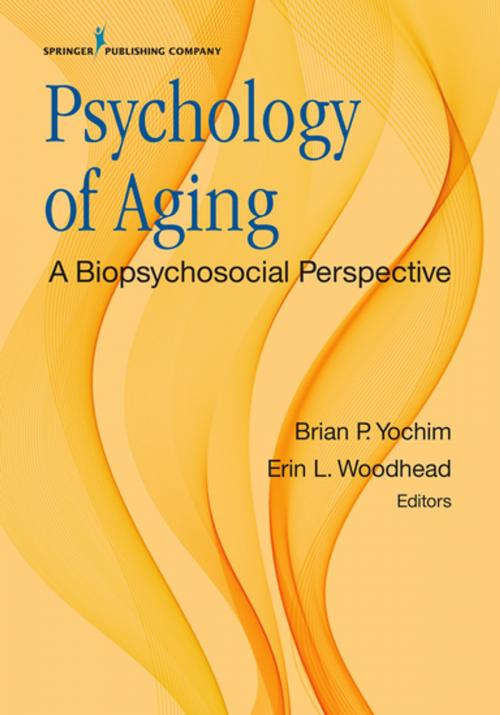Psychology of Aging
A Biopsychosocial Perspective
Nonfiction, Health & Well Being, Psychology, Developmental Psychology| Author: | ISBN: | 9780826137296 | |
| Publisher: | Springer Publishing Company | Publication: | December 28, 2017 |
| Imprint: | Springer Publishing Company | Language: | English |
| Author: | |
| ISBN: | 9780826137296 |
| Publisher: | Springer Publishing Company |
| Publication: | December 28, 2017 |
| Imprint: | Springer Publishing Company |
| Language: | English |
"The book goes well beyond the information in undergraduate texts and provides stimulating and useful coverage of key topics in biopsychosocial aging. Psychology is not prepared for the future growth of our older adult population, and I suggest Psychology of Aging: A Biopsychosocial Perspective as required reading for students" --William E. Haley, PhD; Professor; School of Aging Studies; College of Behavioral and Community Sciences, Tampa, FL
"This book distinguishes itself from previous publications on the topic with a thorough review of the history profession of geropsychology and its timely inclusion of chapters on brain imaging techniques and the aging brain, cultural differences in aging ethnic and sexual minorities, cognitive interventions, and more. This book is a must read for undergraduate and graduate students studying aging, and one I will definitely recommend to students new to the area."--Sherry A. Beaudreau, Ph.D., ABPP, VA Palo Alto Health Care System and Stanford University School of Medicine
"Brian Yochim and Erin Woodhead have created an invaluable tool for learning about and teaching geropsychology...This book will serve as a seminal text in training psychologists, social workers, and many other disciplines in the psychology of aging." --Erin E. Emery-Tiburcio, Ph.D., ABPP, Rush University, Chicago, IL
The only graduate text to encompass the full range of issues regarding the psychology of aging
This is the first graduate-level text that offers a comprehensive, in-depth chronicle of issues surrounding the psychology of aging emphasizing psychology, with a foundation in the biology, and an expansion into the sociological aspects of aging. The text is divided into three sections: biological underpinnings of aging, psychological components of aging, and social aspects of aging. Among the multitude of topics addressed are biological theories of aging, neuroimaging methods in aging research, neuroplasticity, cognitive reserve and cognitive interventions, a detailed overview of neurocognitive disorders in aging such as Alzheimer's disease and Lewy body disease, relationships in aging, work vs. retirement, cultural issues in aging, and aging and the legal system, to name just a few critical topics.
With an emphasis on promoting critical thinking, the text is enriched with discussion questions in each chapter along with suggestions for more in-depth readings. In addition it includes chapter PowerPoints and an Instructor’s Manual with sample syllabi for a 10-week course and a 15-week course. Written for graduate students in multiple gerontology-related disciplines, the text is also of value to individuals studying nursing, medicine, social work, biology, and occupational, physical, and speech therapies.
Key Features:
- Addresses the biological underpinnings of aging, psychological components, and social aspects
- Written by a variety of experts on each area
- Emphasizes critical thinking throughout the text
- Presents discussion questions in each chapter
- Includes PowerPoints and an Instructor’s Manual with sample syllabi
- Tailored to graduate students from multiple disciplines embarking on clinical or research careers involving older adults.
"The book goes well beyond the information in undergraduate texts and provides stimulating and useful coverage of key topics in biopsychosocial aging. Psychology is not prepared for the future growth of our older adult population, and I suggest Psychology of Aging: A Biopsychosocial Perspective as required reading for students" --William E. Haley, PhD; Professor; School of Aging Studies; College of Behavioral and Community Sciences, Tampa, FL
"This book distinguishes itself from previous publications on the topic with a thorough review of the history profession of geropsychology and its timely inclusion of chapters on brain imaging techniques and the aging brain, cultural differences in aging ethnic and sexual minorities, cognitive interventions, and more. This book is a must read for undergraduate and graduate students studying aging, and one I will definitely recommend to students new to the area."--Sherry A. Beaudreau, Ph.D., ABPP, VA Palo Alto Health Care System and Stanford University School of Medicine
"Brian Yochim and Erin Woodhead have created an invaluable tool for learning about and teaching geropsychology...This book will serve as a seminal text in training psychologists, social workers, and many other disciplines in the psychology of aging." --Erin E. Emery-Tiburcio, Ph.D., ABPP, Rush University, Chicago, IL
The only graduate text to encompass the full range of issues regarding the psychology of aging
This is the first graduate-level text that offers a comprehensive, in-depth chronicle of issues surrounding the psychology of aging emphasizing psychology, with a foundation in the biology, and an expansion into the sociological aspects of aging. The text is divided into three sections: biological underpinnings of aging, psychological components of aging, and social aspects of aging. Among the multitude of topics addressed are biological theories of aging, neuroimaging methods in aging research, neuroplasticity, cognitive reserve and cognitive interventions, a detailed overview of neurocognitive disorders in aging such as Alzheimer's disease and Lewy body disease, relationships in aging, work vs. retirement, cultural issues in aging, and aging and the legal system, to name just a few critical topics.
With an emphasis on promoting critical thinking, the text is enriched with discussion questions in each chapter along with suggestions for more in-depth readings. In addition it includes chapter PowerPoints and an Instructor’s Manual with sample syllabi for a 10-week course and a 15-week course. Written for graduate students in multiple gerontology-related disciplines, the text is also of value to individuals studying nursing, medicine, social work, biology, and occupational, physical, and speech therapies.
Key Features:
- Addresses the biological underpinnings of aging, psychological components, and social aspects
- Written by a variety of experts on each area
- Emphasizes critical thinking throughout the text
- Presents discussion questions in each chapter
- Includes PowerPoints and an Instructor’s Manual with sample syllabi
- Tailored to graduate students from multiple disciplines embarking on clinical or research careers involving older adults.















